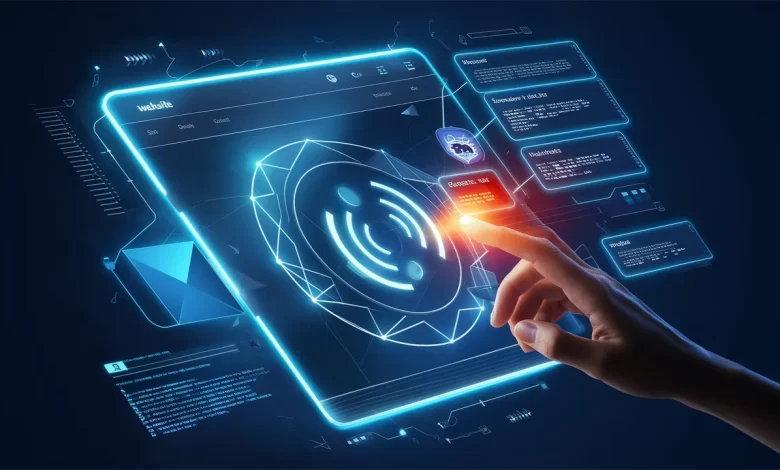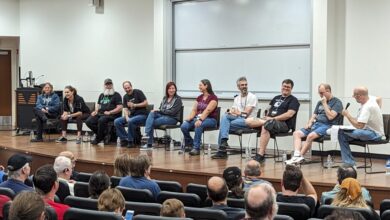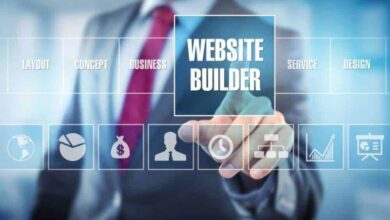The Future of Website Building: AI-Powered Solutions for Easier, Smarter, and More Personalized Websites

Website building is revolutionizing with artificial intelligence (AI) at the forefront. AI is rapidly transforming how we design, develop, and maintain websites, promising a future where the process becomes more straightforward, more intuitive, and tailored to the specific needs of users.
This article explores how AI will reshape the landscape of website creation, focusing on streamlining the design process, automating tedious tasks, and crafting user interfaces (UI) that address individual pain points and adapt based on users’ locations.
What are AI Website Builders?
AI website builders are platforms that leverage artificial intelligence to automate and streamline the process of website creation. These tools employ various AI techniques, including natural language processing (NLP), machine learning (ML), and computer vision, to generate website layouts, suggest design elements, write content, and even optimize for search engines. The global AI website builders market is growing rapidly.
Key Areas Where AI Will Change Website Building
Let’s delve into the specific ways that AI will enhance the website-building experience:
1. AI-Driven Design and Layout
- Goodbye, Blank Page Syndrome: AI-powered tools can analyze your preferences, content, and industry to generate customized layout suggestions, providing inspiration and a solid starting point for your website’s design.
- Smart Optimization: AI algorithms can continually analyze layouts, suggesting changes for visual appeal, user experience (UX) optimization across devices, and alignment with web design best practices.
- Hyper-Personalization: AI can recommend images, videos, and styling elements that resonate with your target audience based on demographics, cultural preferences, and other factors.
2. User-Centric UI Design Informed by Pain Points
- Empathetic Websites: AI can analyze user behavior, feedback, and standard support inquiries. This data can fuel website design changes that address pain points, reduce frustration, and improve user experience.
- Location-Aware Design: AI can factor in a user’s location to tailor content and design elements, such as language translations, local imagery, and even adjusting the layout based on cultural preferences for navigation.
- Accessibility for All: AI can identify potential barriers for users with disabilities and suggest changes to ensure your site complies with accessibility guidelines, making it more inclusive.
3. AI-Assisted Content Creation
- Overcoming Writer’s Block: AI tools can assist with basic copywriting, like product descriptions or blog post summaries, and suggest creative content ideas to jumpstart the writing process.
- Image and Video Generators: AI can now create unique images or help edit videos based on your needs. This eliminates time searching for suitable stock media and helps your content stand out.
- Multilingual Websites Made Easy: AI-powered translation services will improve accuracy and fluency, making it easier to offer websites in multiple languages to reach a global audience.
4. Streamlined Development with Automation
- Code Generation and Optimization: AI can assist with generating some basic code and identify areas for refactoring to improve website performance and load times.
- Automated Testing: AI can run compatibility tests, detect bugs, and suggest design changes based on how real users interact with your site. This saves valuable developer time.
- Proactive Maintenance: AI can monitor websites for potential errors or security threats. This allows issues to be fixed before they cause significant disruptions.
Benefits of AI-Powered Website Building
- Democratization of Design: AI website builders empower individuals and businesses with limited technical expertise to create professional-looking websites without the need for coding skills. This democratization of web development opens up new possibilities for entrepreneurs, small businesses, and non-profits to establish their online presence.
- Increased Efficiency: AI-powered tools can significantly reduce the time and effort required to build a website. They automate repetitive tasks, generate design suggestions, and streamline content creation, enabling developers to focus on higher-level aspects of web development.
- Enhanced User Experience: AI can be used to optimize website layouts, navigation, and content for maximum user engagement. For example, AI algorithms can analyze user behavior to suggest the most effective placement of call-to-action buttons or personalized product recommendations.
- Personalization at Scale: AI website builders can analyze user data and behavior to deliver personalized website experiences. This means that each user sees a website tailored to their individual preferences, leading to increased engagement and conversions.
- Continuous Optimization: AI-powered tools can continuously monitor website performance and user behavior, providing insights and recommendations for ongoing optimization. This ensures that websites remain relevant, engaging, and effective over time.
Building with Brains: 10 AI Website Builders
Let’s dive into the top 10 AI website builders, specifically focusing on those that prioritize clean and simple layouts. We’ll explore their unique features, user-friendliness, customization options, and suitability for various needs.
Here’s a curated list focusing on platforms that either have a strong emphasis on AI-powered design or boast unique and cutting-edge AI tools:
Top 10 AI Web Builders with Emphasis on Clean Layouts & Innovation
- Wix ADI: An established leader, Wix ADI continues to innovate. Their AI suggests layouts, generates text content, and creates custom color palettes.
- Squarespace: While not strictly an “AI-first” platform, Squarespace is known for stunning templates. They’ve recently integrated AI for image generation and basic content suggestions.
- Zyro (Hostinger Website Builder): Emphasizes speed and ease, with AI assisting in grid-based layouts and pre-designed content blocks using Zyro. Great for minimalist sites.
- Ucraft: Offers visually appealing templates and a built-in AI logo maker for quick branding. Features like a landing page builder add versatility.
- Webflow: A favorite among web designers, Webflow integrates AI tools for image generation and content assistance, expanding its appeal for those seeking flexibility and AI support.
- Framer: Favors simplicity, with AI helping create websites in minutes. Suitable for those needing a quick, no-frills online presence.
- Jimdo (Dolphin): Their Dolphin AI focuses on quickly building an essential website. The generated layouts prioritize visual appeal and are easy to customize.
- Mozello: Offers an AI-powered “Site Wizard” that tailors site suggestions based on your industry. Emphasizes clean aesthetics and straightforward customization.
- Bubble: As a more advanced “low-code” platform, Bubble incorporates AI features to streamline app and website building, including layout assistance and code suggestions.
- 10Web: Creates AI-powered WordPress templates and is super fast and easy to set up. It also automatically migrates existing websites to their WordPress templates.
The Future: AI as Your Web Design Co-Pilot
AI won’t fully replace human web designers and developers. Instead, envision AI as a powerful collaborator, enhancing your skills throughout the website-building process:
- Brainstorming and Inspiration: AI becomes a source of creative ideas and solutions when you face a design challenge.
- Rapid Prototyping: AI speeds up the creation of functional ‘mock-ups’ to quickly test and refine layout concepts and site features
- Continuous Optimization: AI partners with you to monitor performance, suggest changes based on data, and streamline updates.
Getting Started with AI-Powered Website Building
- Experiment with AI Website Builders: To get hands-on experience, explore platforms like Wix ADI, Squarespace, or those with emerging AI design features.
- Integrate AI Tools: Upgrade your existing workflow by using AI-powered content generators, image/video editors, and analytics tools.
- Stay Updated: This field evolves rapidly. Keep informed on new AI advancements and how they can benefit your web presence.
Addressing Concerns and Ethical Considerations
As with any powerful technology, it’s important to proactively address potential concerns and ethical issues surrounding AI’s use in website building:
- The Creativity Question: Web designers may worry that AI will stifle originality. It’s key to view AI as a tool that empowers human designers, not a replacement for their unique vision.
- Algorithmic Bias: AI systems trained on biased data can perpetuate harmful stereotypes. Therefore, ensuring diversity in datasets and prioritizing explainable AI is crucial.
- Data Privacy: AI-powered personalization depends upon collecting user data. Transparency about data collection and responsible use are paramount for building trust with your audience.
Beyond the Basics: Exciting AI Innovations on the Horizon
The scope of AI’s impact on website building is constantly expanding. Here’s a glimpse into some cutting-edge developments to watch for:
- Voice Recognition Interfaces: Building websites using natural language commands could become the norm, further lowering the barrier to entry.
- AI-Powered A/B Testing: AI could run sophisticated A/B tests on layout, content, and personalization, taking the guesswork out of optimization and delivering unparalleled data insights.
- Advanced Chatbots and Virtual Assistants: AI will create even more intuitive chatbots that provide support and guide users in building or modifying their own websites.
- Predictive Design: AI might be able to anticipate and suggest website changes based on emerging trends and shifting user expectations before issues arise.
Conclusion: A Brighter Future for Websites
The integration of AI into website building marks a transformative era. AI has the potential to streamline tedious processes, empower individuals to create impactful online presences and deliver tailor-made experiences that anticipate user needs and preferences. By combining AI’s strengths with human creativity and strategic input, the future of websites is undoubtedly brighter, more accessible, and more user-centric than ever. Do you see AI changing how you build or interact with websites?
*** This is a Security Bloggers Network syndicated blog from Meet the Tech Entrepreneur, Cybersecurity Author, and Researcher authored by Deepak Gupta – Tech Entrepreneur, Cybersecurity Author. Read the original post at: https://guptadeepak.com/the-future-of-website-building-ai-powered-solutions-for-easier-smarter-and-more-personalized-websites/



